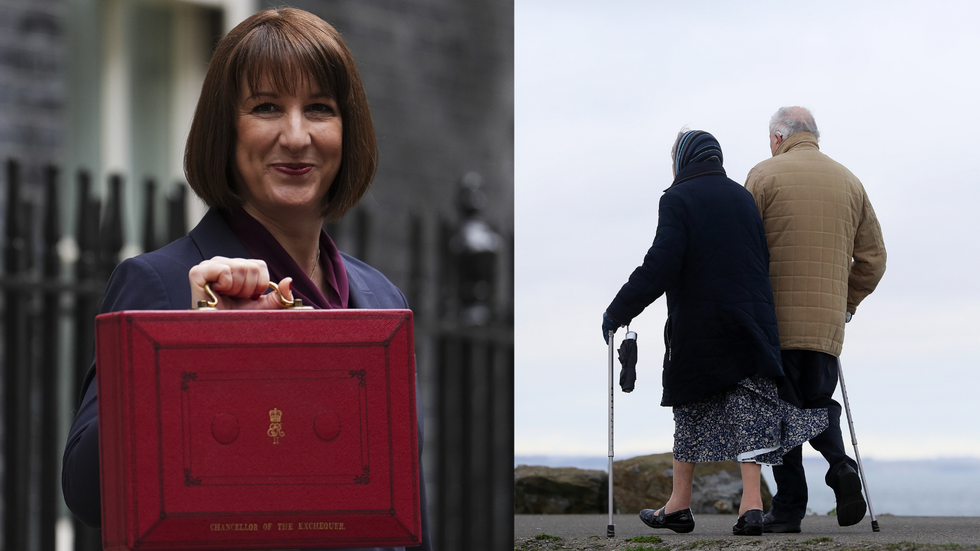Britons can gift 'any amount' to family without paying inheritance tax – but there are 3 rules to follow
With pensions now liable for inheritance tax from 2027, now is an opportune time to review gifting strategies
Don't Miss
Most Read
Trending on GB News
Britons can gift any amount to family members without paying inheritance tax, provided they follow three strict rules.
This strategy is particularly important to consider ahead of the Autumn Budget.
With potential economic challenges looming from Trump's tariffs and the possibility of a global recession, now is the time to prepare financially.
As Sarah Coles, head of personal finance at Hargreaves Lansdown, puts it: "The fallout from the tariff drama could come together in a difficult autumn Budget, so we need to fix the roof while the sun shines."
Britons can give away unlimited amounts inheritance tax free if they gift it out of surplus income.
This is a special inheritance tax exemption that allows people to give away money regularly from their income subject to three rules.
Coles said: "Gifting out of surplus income may also prove popular. You can give any amount, and it leaves your estate straightaway, as long as you can prove the gifts are regular, come from income and don’t affect your standard of living."
 The standard inheritance tax rate is 40 per cent above the £325,000 thresholdGETTY
The standard inheritance tax rate is 40 per cent above the £325,000 thresholdGETTYThe first rule for tax-free gifting from surplus income is that the gifts must be regular and form a consistent pattern. This isn't a one-off arrangement.
According to Shaun Moore, tax and financial planning expert at Quilter, these gifts must form "part of a consistent pattern."
Les Cameron, head of technical at M&G Wealth, adds: "It's one of the most generous reliefs available but also one of the most overlooked because it requires detailed record-keeping."
HMRC will typically request evidence when someone dies to verify the gifting met exemption criteria.
The second rule is that gifts must come from surplus income rather than capital. This is a fundamental distinction that HMRC scrutinises closely.
 Rachel Reeves has targeted pensions and farmers with inheritance tax changesGB News
Rachel Reeves has targeted pensions and farmers with inheritance tax changesGB NewsColes explains that these gifts must "come from income and don't affect your standard of living."
When verifying this exemption, HMRC will request evidence such as bank statements and a written schedule of gifts.
This documentation helps prove the money came from regular income rather than savings or investments.
Maintaining clear financial records is essential to demonstrate compliance with this requirement.
The third rule is that gifts must not affect the giver's standard of living. This ensures the donor isn't impoverishing themselves to reduce tax liability.
Coles suggests: "Examples could include paying school fees for a grandchild."
The key is demonstrating these payments don't impact one's lifestyle or financial security.
She said: "You will need to make careful notes of your gifting to prove it is being made regularly and enable your loved ones to explain to HMRC if any questions are asked."
This exemption is particularly valuable as it allows unlimited gifting when properly documented.
Beyond the surplus income exemption, Britons have several other gifting allowances available to reduce inheritance tax liability.
Everyone has an annual allowance of £3,000 which can be given to one person or split between several recipients.
There's also a small gift allowance of £250 that can be given to as many people as desired, though not to anyone who received part of the £3,000 allowance.
 Inheritance tax can be reduced by giving gifts - but rules do apply GETTY
Inheritance tax can be reduced by giving gifts - but rules do apply GETTYWedding gifts are also exempt: up to £5,000 for children, £2,500 for grandchildren and £1,000 for anyone else.
These gifts leave your estate immediately for inheritance tax purposes.
For those considering larger gifts, potentially exempt transfers offer another option. These larger one-off gifts pass out of your estate after seven years.
Coles added: "If you're concerned about a potential inheritance tax bill, you might want to make the gift sooner rather than later, and get the clock ticking."







